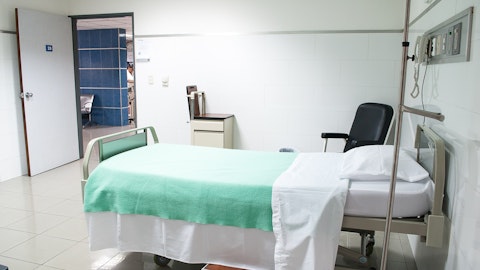Organogenesis Holdings Inc. (NASDAQ:ORGO) Q3 2023 Earnings Call Transcript November 9, 2023
Organogenesis Holdings Inc. beats earnings expectations. Reported EPS is $0.09075, expectations were $0.01.
Operator: Welcome, ladies and gentlemen, to the Third Quarter of Fiscal Year 2023 Earnings Conference Call for Organogenesis Holdings Inc. [Operator Instructions]. Please note that this conference call is being recorded and that the recording will be available on the company’s website for replay shortly. Before we begin, I would like to remind everyone that our remarks today may contain forward-looking statements that are based on the current expectations of management and involve inherent risks and uncertainties that could cause actual results to differ materially from those indicated, including the risks and uncertainties described in the company’s filings with the Securities and Exchange Commission, including Item 1A, Risk Factors, of the company’s most recent annual report and its subsequently filed quarterly reports.
You are cautioned not to place undue reliance upon any forward-looking statements, which speak only as of the date made. Although it may voluntarily do so from time to time, the company undertakes no commitment to update or revise the forward-looking statements whether as a result of new information, future events or otherwise, except as required by applicable securities laws. This call will also include references to contain financial measures that are not calculated in accordance with generally accepted accounting principles or GAAP. We generally refer to those as non-GAAP financial measures. Reconciliations of those non-GAAP financial measures to the most comparable measures calculated and presented in accordance with GAAP are available in the earnings press release in the Investor Relations portion of our website.
I would now like to turn the call over to Mr. Gary Gillheeney, Sr., Organogenesis Holdings President and Chief Executive Officer and Chair of the Board. Sir, please go ahead.
Gary Gillheeney: Thank you, operator, and welcome, everyone, to Organogenesis Holdings Third Quarter of Fiscal Year 2023 Earnings Conference Call. I’m joined on the call today by Dave Francisco, our Chief Financial Officer. Let me start with a brief agenda of what we will cover during our prepared remarks. I’ll begin with an overview of our second quarter revenue results, and an update on our key operating developments in recent months. Dave will then provide you with an in-depth review of our third quarter financial results, our balance sheet and financial condition at quarter end as well as our financial guidance for 2023, which we reintroduced in our press release this afternoon. Then I will share some closing thoughts before we open the call for your questions.
Let me start by reviewing our revenue for Q3. We reported net revenue of $108.5 million for the third quarter, down 7% year over year, Sales of our Advanced Wound Care products decreased 7% when sales of our Surgical And Sports Medicine products decreased 2% compared to the prior year. Q3 sales reflect the significant business disruption we experienced as a result of the local coverage determinations or LCD published. Then, I will share some closing thoughts before we open the call for your questions. Let me start by reviewing our revenue for Q3. We reported net revenue of $1.85 million for the third quarter, down 7% year-over-year. Sales of our Advanced Wound Care products decreased 7% and sales of our Surgical & Sports Medicine products decreased 2% compared to the prior year.
Q3 sales reflect a significant business disruption we experienced as a result of the local coverage determinations or LCDs published by three Medicare administrative contractors on August 03, which we discussed on our second quarter conference call. Specifically after a strong start to the quarter and despite delivering strong year-over-year growth through August, our sales trends were materially impacted during the month of September. The impact of this business disruption was most acutely experienced in the regions of U.S. where these MACs operates. Q3 sales and the LCD impacted MACs Regions declined in the high teens year-over-year and we experienced a modest decline in the non LCD impacted regions, primarily in the office setting. We are proud of the team’s execution and commitment to our mission, not just the commercial team in the field, but throughout the organization as these teams worked tirelessly following the August 3rd announcement, engaging with all relevant parties in advance of the stated effective date of the LCDs to convince the MACs to withdraw the LCDs and thereby protecting the customers and patients that we serve.
As announced on September 28, all three MACs withdrew the final LCDs for skin substitute grafts, cellular and/or tissue-based products, for the treatment of diabetic foot ulcers and venous leg ulcers that were scheduled to take effect on October 1st. We applaud the MACs and CMS for capital considering the shareholders and stakeholders concerns regarding the LCD’s potential negative impact and putting the needs of patients first in coming to this decision. We thank all of the stakeholders, including physicians, patient advocacy groups, and clinical and industry associations concerned about the negative health outcomes, including prolonged treatment and serious infections which often lead to amputations and associated higher mortality for their support and advocating for the withdrawal of the LCDs. We also thank the stakeholders concerned about the treatment disparity in health and equity impact of the LCD that would have had on the populations with higher rates of diabetes and other comorbidities for their support.
Clearly, we are pleased with the withdrawal of the LCDs, but that said, the overall business disruption in the marketplace, including significant confusion and uncertainty among customers as well as aggressive in certain circumstances, questionable competitive response impacted our capacity to engage with new and existing customers affecting the adoption and utilization of our product and ultimately affecting our third quarter sales results. While we are pleased with the LCD’s withdrawal, we continue to navigate through the challenging environment created by their proposed adoption. We have reintroduced our 2023 financial guidance, which reflects the impact of business disruption in the third quarter, as well as our recovery activities throughout the year.
The commercial team is actively reengaging with our customers to bring our products back to the healing algorithms and formularies. These efforts are progressing well. However, our share of voice has been focused on clarifying the misinformation in the market, limiting our resources on delivering our clinical messaging and expanding our customer base. Turning to update on our operational progress in recent months. We continue to focus on invest and expand in manufacturing capacity overall for our portfolio and pipeline, as well as to drive long-term efficiencies, enhance our optionality for the future. We continue to work with outside advisors to identify and evaluate potential options. We are currently targeting a final plan here by the end of calendar year 2023.
Our ongoing Phase III clinical trial for ReNu for the treatment of knee osteoarthritis continues to progress as planned. We continue to expect to achieve the last patient, last visit milestone by the end of the year, allowing for analysis of the data early next year. We’ve also made progress with respect to our second Phase III study for ReNu. We enrolled the first patient in September as expected and as previously discussed, we expect to have a subsequent discussion with the FDA regarding the clinical data requirements for the BLA and we intend to propose the current Phase III trial combined with the published 200 patient RCT as valid scientific evidence and sufficient for BLA approval. With that, let me turn the call over to Dave.

David Francisco: Thanks, Gary. I’ll begin with a review of our third quarter financial results. Thank you, Gary. I’ll begin with a review of our second quarter financial results. Unless otherwise specified, all growth rates referenced during my prepared remarks are on a year-over-year basis. As Gary mentioned, net revenue for the third quarter was $108.5 million down 7%. Our Advanced Wound Care net revenue for the third quarter was $101.4 million down 7% and net revenue from Surgical & Sports Medicine products for the third quarter was $7.2 million, down 2%. Gross profit for the third quarter was $82.7 million or approximately 76.2 percent of net revenue compared to 77.6% last year. The decrease in gross profit and margin resulted primarily from a decrease in pricing for certain of our products as well as a shift in product mix compared to the prior year period.
Operating expenses for the third quarter were $74.7 million compared to $88.9 million last year, a decrease of $14.2 million or 16%. The decrease in operating expenses in the third quarter was driven by a $15.1 million or 19% decrease in selling, general and administrative expenses, offset partially by a $0.9 million or 9% percent increase in research and development costs compared to the prior year period. Third quarter GAAP operating expenses included $0.1 million of restructuring related activities compared to $0.6 million in the prior year as well as $1.6 million of legal costs and compensation costs related to our efforts to convince the MACs to withdraw the LCDs compared to no such costs in the third quarter of 2022. Third quarter 2022 GAAP operating expenses also included certain two non-operating items, $4.2 million charge related to disposal of certain equipment related to the construction and progress in one of the company’s Canton, Massachusetts facilities, $0.6 million of cancellation fees incurred in connection with the company’s decision deposits, manufacturing facility, construction project.
Excluding these items and noncash intangible amortization of $1.2 million in both periods, non-GAAP operating expenses for the third quarter decreased $10.5 million or 13%. The material reduction in our non-GAAP operating expenses is related to the timing of expenses year-over-year, and a result of our proactive strategy to manage costs in light of the challenging operating environment. We have implemented additional cost reduction initiatives in recent weeks to further mitigate the impact to profitability from the lower fourth quarter revenue outlook. Operating income for the third quarter was $8.1 million compared to $1.8 million last year, increase of $6.3 million. Total other expenses net for the third quarter were $0.4 million compared to $0.6 million last year, a decrease of $0.2 million and net income for the third quarter was $3.2 million compared to $0.2 million last year, an increase of $3 million.
Adjusted net income for the third quarter was $5.3 million compared to $5.1 million last year, an increase of $0.2 million. As a reminder, adjusted net income is defined as GAAP net income adjusted to exclude the effect of amortization and restructuring charges and the resulting income taxes on those items. Adjusted EBITDA for the third quarter was $16 million or 14.7% of net revenue compared to $11.6 million or 9.9% of net revenue last year. We believe the operating leverage delivered in the third quarter is notable in light of the year-over-year decline in revenue. We have provided a full reconciliation of our adjusted EBITDA results in our earnings release. Turning to the balance sheet as of September 30, 2023, the company had $98.8 million in cash, cash equivalents and restricted cash and $67.6 million in debt obligations compared to $103.3 million in cash, cash equivalents, and restricted cash and $70.8 million in debt obligations as of December 31, 2022.
We’ve also up to $125 million of available borrowings on our revolving credit facility, as of September 30, 2023. Turning to review of our 2023 financial guidance, which we reintroduced in our press release this afternoon, For the 12-months ending December 31, 2023, the company now expects net revenue of between $433 million $446 million representing a year-over-year decrease in the range of 1% to 4% as compared to net revenue of $450.9 million for the year-ended December 31, 2022. The 2023 net revenue guidance range assumes net revenue from Advanced Wound Care products of between $406 million $418 million representing a year-over-year decrease in the range of 1% to 4%. Net revenue from Surgical & Sports Medicine products between $27 million and $29 million representing a year-over-year decrease in the range of flat-to-down 6%.
In terms of profitability guidance for 2023, the company expects to generate GAAP net income of between $4 million and $9 million and adjusted net income of between $11 million $17 million. We also expect EBITDA between $26 million and $37 million and adjusted EBITDA of between $40 million and $51 million. In addition to our formal financial guidance for 2023, we are providing some considerations for modeling purposes. For the fiscal year 2023, we now expect the midpoint our total revenue range for 2023 now assumes sales of PuraPly products to decrease approximately 23% year-over-year and sales of non-PuraPly products will increase approximately 21% year-over-year. Our profitability guidance now assumes gross margins of approximately 76% to 76.5%, Total GAAP operating expenses will decrease approximately 1% to 2% year-over-year and total non GAAP operating expenses will be roughly flat year-over-year.
Our 2023 non-GAAP operating expenses include noncash intangible amortization of approximately $4.9 million, estimated restructuring charges of $3.4 million and $1.6 million of other non-operating items related to our efforts to convince the MACs to withdraw the LCDs. Total interest and other expenses of approximately $2.2 million. GAAP tax rate in the range of 51% to 53% at the high end and low end of our guidance range, respectively, and we continue to expect non-GAAP tax rate on adjustments of 27%. We now expect non-cash depreciation of approximately $9.9 million and non-cash stock comp expense of approximately $9 million and weighted average diluted shares of approximately $133 million. We also expect full year 2023 capex to be approximately $25 million to $30 million.
With that, I’ll turn the call back over to Gary for some closing remarks.
Gary Gillheeney: Thanks, David. Before we open the call to your questions, I wanted to share some additional thoughts on our near-term outlook and underlying assumptions supporting our updated guidance for 2023. The environment remains challenging as a result of the LCDs having been announced this their withdrawal on September 28, while sales trends in October have improved as compared to September, we’re experiencing significant business disruption, driven by customer confusion and uncertainty, as well as aggressive and in certain circumstances questionable competitive response. Our fourth quarter guidance assumes improvement as we move through the quarter, but we expect our sales reps to be spending more time servicing the existing customers and regaining lost customers versus cultivating new customer adoptions.
This is the primary driver of the lower revenue expectations reflected in our updated guidance as compared to what our prior guidance assumed for the fourth quarter of 2023. While the second half growth trajectory for Organogenesis has been impacted by the LCD-related customer confusion, we believe this is largely transitory. We continue to actively engage with customers and have multiple commercial support programs underway with targeted strategy to regain lost accounts and enhance existing customer relationships and as we build our customer base back in the fourth quarter, we are building momentum as we close out 2023. Looking ahead to 2024, we will launch new products across both Advanced Wound Care and Surgical Sports & Medicine market and will continue to be a leader in the space with highly innovative, highly efficacious products that deliver on our mission to provide integrated healing solutions that substantially improve outcomes while lowering the overall cost of care.
With that, I’ll turn the call over to the operator to open the call up for questions.
See also 13 Best Materials Stocks To Buy and Bill Gates Net Worth, Investments and Holdings.
Q&A Session
Follow Organogenesis Holdings Inc. (NASDAQ:ORGO)
Follow Organogenesis Holdings Inc. (NASDAQ:ORGO)
Receive real-time insider trading and news alerts
Operator: Thank you sir. [Operator Instructions]. Our first question will come from Ryan Zimmerman of BTIG. Please go ahead.
Ryan Zimmerman: Hey. Thanks for taking the questions. I’m juggling a few calls tonight, so I apologize that this was covered earlier, Gary. But CMS’s final rule came out recently for 2024 really didn’t have much change kind of despite all the angst and speculation this year in terms of how CMS thinks about skin substitutes and so forth. And just curious kind of how we should be thinking about the market dynamics given the continuation of a high cost, low cost bundle structure and really just your view of – excuse me – of whether at some point there is going to be a change in payment models in in this area of medicine.
Gary Gillheeney: Yes. Sure. Thanks for the question, Ryan. So you’re correct. The 2024 physician fee and hospital outpatient reimbursement really didn’t have much change at all. I think going forward that there will be some changes, particularly in the office setting. I think the dynamics of the market right now I think maybe the impetus behind some of the LCD changes that were rescinded was to bring discipline to the market and stability to the market and I think that’s necessary. So I do think over time, there will be a change in the off I think, and an appropriate change, I think, could be very positive, quite frankly. So we’ve advocated for an ASP Plus 6 model, which we think would bring some stability quickly to the market, but I think going forward, we’re also looking at more creative bundling scenarios that I think could actually be better for patient care and more stable for the industry and really bring some distinction between the products and the overall efficacy of those products.
So I think we’ll see something in the next two to three years. I think there’ll be structural changes, particularly in the office. In HOPD, there may be a response, to whatever changes in the office. So there are not incentives to push more patients back into the office – excuse me – back into the hospital, which is a higher cost setting. So they need to coordinate, in my opinion, those two models and, I think they will and I think that’ll happen in the next two to three years.
Ryan Zimmerman: Very helpful. And, the LCDs is being pulled, I think, was a win for you guys, and it you know, as you noted, it didn’t make a whole lot of sense, but there is confusion in the market. So just help us understand, beyond fourth quarter of this year, how you think that can – what does that continue? I mean, how are you preparing to inform the market, given that there aren’t these changes happening from the LCDs?
Gary Gillheeney: Yes. Great question. And as I mentioned in the prepared remarks, a lot of our share of voice in those affected MAC areas and even outside of the impacted MACs, there’s a lot of misinformation and we’re spending a lot of our share of voice on correcting that misinformation and making sure our customers do understand that our products are reimbursed and getting them back on formulary – particularly in HOPD, where it’s a more efficient model that they’ll quickly take you off their formulary if there’s a reimbursement change and expected change, particularly when you think about the treatment algorithm with a patient it’s typically not one application. So you need to address that from a reimbursement perspective early.




